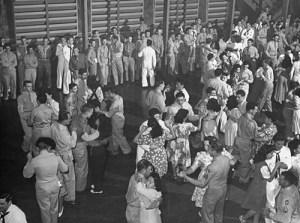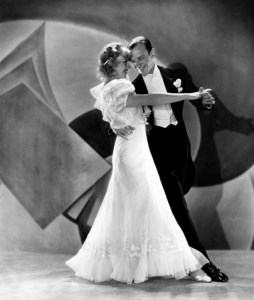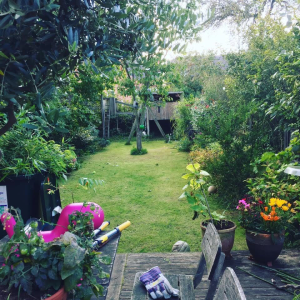The streets that I grew up in were fashioned from blackened Yorkshire stone and each of these solid streets nourished hundreds of dwellings and lives just like mine. Life spilled out of every brick and crack and yard. There were dogs and cats, and rats, and rag and bone men on trailers with horses, and men delivering milk and fish on floats and factories all around that smoked. Women wore hair in curlers and smoked like troopers, and men in flares and fly away collars swaggered about and got in to fights on the corners.
Waste land was taken over by hordes of kids and made in to race tracks and everything seemed to co-exist in a perfect harmony. Like an image from a Lowry painting.
That’s how I remember it, and how it felt safe.
Everyone knew each other back then. Everyone knew you, and everyone knew your business, and that was fine, because you knew theirs in return.
I had hundreds of Auntys and hundreds of Uncles. We weren’t related. It was just something you were taught to call someone because they lived on the street.
Apart from the old lady that lived on the corner. She was different, and wanted to be left to herself.
She lived behind net curtains that covered dirty windows, where lights never came on.
We all called her the angry old woman. Us kids.
She was the oldest person that I had ever seen back then with deep lines in her face. Skinny and dishevelled, with hair that had turned yellow with age. The story was that she was a witch, and we all believed it.
Our gang would go play football or catch outside her house. It was cobbled that spot, but it was a nice open bit, and the cars weren’t allowed on, so we’d be drawn to playing there.
She didn’t like this, and had been out a few times in the past to tell us off for the noise. We’d been scared and run off.
When I told my mum, she’d said (in cross flamboyant Punjabi), that if she’d “told me once, then she’d told me a hundred times not to go bothering that old lady with our noise”. Some phrases don’t translate that well, but this one does.
The problem was, that my mother was a grown up.
The thing with grown-ups was that they couldn’t appreciate what it was like to be a child.
And so it was, one beautiful sunny day, filled with the blissfulness of youth, I took my ball out and chose to ignore what my Mother had told me, a hundred times already.
The gang gathered outside the angry old ladies house. It was great playing there.
We threw the ball this way, and then that, kicked it here, and then there, and then played some tag, and before I knew it carelessness ensued.
A kick saw it flying high up in to the sky, and sure enough, as one might predict (when one is an adult and has experience on their side), the ball ended up in the angry old ladies garden.
Now, my parents were poor. And a ball was a ball.
Balls didn’t come easy.
They certainly didn’t grow on trees.
I wouldn’t be getting another one any time soon, that was for sure.
What was to be done? Apart from go fetch it. Volunteers suddenly became scarce. We dibbed for it, but no one felt up to the task.
The unanimous verdict was that I should be the one to go and retrieve it, as it was my ball, and anyways everyone suddenly decided that I was the bravest of the bunch.
The reality was that I was far from brave.
I’d heard stories of kids that had gone in to this garden looking for their ball and they’d never been seen or heard of again. Some said, or so the story went, that she’d caught them and eaten them, and buried their bones in her garden. That’s why nothing nice grew because it was full of old bones.
And it was true, nothing nice did grow, it was dead even in the middle of Summer.
So, there I stood at the garden gate, with my fingers on the latch, and pushed gently. It groaned in its hinges and I hoped she hadn’t heard. I could see the ball as clear as day, and if I was fast I was sure I could get it. So, I made a run for it, across overgrown paths that covered all of the dead things that were hidden underneath.
It was just as I bent to pick it up, that I heard the tapping on the glass. She was watching me from the window with beady spectacled eyes, her long crooked fingers beckoning me to the door. My friends were nowhere to be seen, and as I stood at the door, I suddenly felt very very small.
‘What are you doing?’ she said sharply. She wasn’t dressed like a witch.
‘Please miss I was just getting my ball’ I managed to squeak out.
‘Give it to me’, she said. Then reaching down she took it off me, and before I could say anything else, she’d closed the door quietly, and firmly in my face. What else was there to do but go home without my ball, on the one hand devastated, and the other jolly well pleased I had made it out alive.
Sam was our elderly neighbour, and very wise. I decided to ask him about the angry old woman and why it was that she was so mean.
He said that “losing people did funny things to their heads and that she’d pretty much gone and lost her’s years ago after that tragedy”.
Well this made no sense. The loss of people. Perhaps it felt the same as losing my ball
I told my friends what I knew, but they couldn’t understand it. Not like me.
Loss was something you had to feel to understand and not everyone had lost a ball like I had.
Then, quite oddly, some days later, the ball reappeared, Sam was out in his yard pruning back his roses as he always was, and he said “she’d probably thought better of it and brought it back for me” and that I ought to “count my lucky stars”.
It was Autumn and windy, and the leaves were whipped up swirling around me like a cloak. I ran up and down the street shouting as loudly as I could flapping my arms, excited by this force of nature, trying to mimic it as young children do.
I could fly. One moment I was an eagle swooping and gliding, another a propeller on a jet plane, soaring. I came to rest as a leaf would outside her garden gate and found her elegantly dancing in her bare feet.
It was cold, her white dress was thin, and the wind played with her long yellowing hair which hung about her face and being a child I thought she’d become an angel. I know it sounds silly now as a grown up.
I told all my friends about her,but no one believes kids. Not even other kids and for a while I looked out for her whenever I walked past hoping to prove to others what I thought I’d seen, but she never reappeared again after that. Funny how I forgot all about her for forty years or more.
It was my last day at work, and twenty years worth of days had passed in that place.
As I left the building for the last time, she suddenly came to mind. It was the leaves chasing each other down the road perhaps that did it.
I wondered what had become of her, had she remained stuck forever, or had she taken courage and moved onwards. I wonder what she’d have gone on to do, become a ballroom dancer maybe, or better still, the oldest female footballer in the world teaching kids fancy tricks, the sort my boys go and learn now.
Perhaps she wrote her memoirs in books that became bestsellers and moved somewhere warm and bright by the sea, swapping her dark rooms for the sun. I don’t really know.
We all get stuck at some point in our life, and it can feel hard leaving familiarity and routine even when there’s the prospect of an adventure ahead of you, and this is so true for me right now.
I guess that must be why I shed a few tears the day I left.











